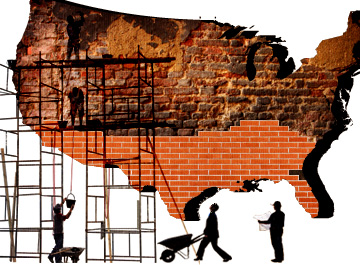The broad outlines of Obama’s recovery package are becoming clear: heavy on the roads and bridges, with a healthy side of tax cuts. But I hope it doesn’t end there. The package should not only boost the economy in the short run, but also set up communities across the country to compete and thrive in the long run. There’s only one way to do that: invest equitably.
So, what kind of recovery package would make sense?
Three words: big, smart and fair.
The current economic crisis has hit low-income people and communities of color first and worst. We have to rethink how and where we make these investments. By just pushing $700 billion (or more) down the same pipeline we always have, we will end up with many new car-choked suburban highways and plenty of pet projects for the politically connected, but we would miss a truly historic opportunity to improve our economy, our environment and our communities. We need to put a down payment on a prosperous and inclusive America.
We have to invest where people live and where they need the most help. Two-thirds of Americans — and the vast majority of the nation’s poor — live in urban regions. By fixing and expanding existing infrastructure there, we can lay the foundation for long-term growth and get struggling residents back to work. We also must invest in the rural areas that have never benefited from the infrastructure many Americans take for granted.
By being smart about the places, people and projects we invest in, this recovery package could be the greatest poverty-fighting tool we’ve seen in generations.
The No. 1 question we should ask when we look to make these investments is, “Does this support the national good?” Will the project expand the economy, create jobs and strengthen our communities?
To answer that question, we have to think about the kind of America we want. With the help of this stimulus, we could move toward a nation that is more competitive and vibrant and richer with opportunity for all people.
We shouldn’t limit ourselves to the outmoded idea that infrastructure means only roads, bridges and other traditional public works projects. We can expand and improve public-transit systems to connect workers to jobs, cut down on greenhouse gases and create thousands of good-paying construction jobs. We can rehab our schools to make them greener, healthier and more energy-efficient environments for our children. We can install broadband lines in low-income communities and help connect entrepreneurs and small businesses to the digital revolution.
We can also use the recovery package to encourage new grocery stores to come back to the low-income communities of color they abandoned decades ago. New fresh-food stores could dramatically increase healthy eating, reduce the out-of-control rates of obesity and diabetes in these communities and provide a vibrant, long-term source of retail jobs for local residents.
The stimulus shouldn’t be only about building structures, either. It should be about building up people and communities — our human capital. By ensuring that 1 or 2 percent of the cost of every project is set aside for job training, we can create a pipeline to get low-income young men and woman and youth of color trained and ready to be part of the massive workforce we will need to get all these projects built. Community colleges are a perfect venue to train people for a new generation of blue-, white- and green-collar jobs.
There is a lot of pressure right now to pump this recovery funding into “shovel-ready” projects that are ready to go on Inauguration Day. We should be cautious about that approach. Too many of the “shovel-ready” projects were conceived and planned under the old way of thinking. If we just move ahead with the ready-to-go lists floating around Washington, we will end up with the same misguided infrastructure projects we’ve always had.
Instead, let’s take a moment to figure out which projects make the most short- and long-term sense. Let’s bring low-income and urban residents to the table and listen to their ideas for how to improve their communities for today and tomorrow.
We have one shot to get this right. We need to make sure we’re lifting up Americans as we lift up the American economy.

